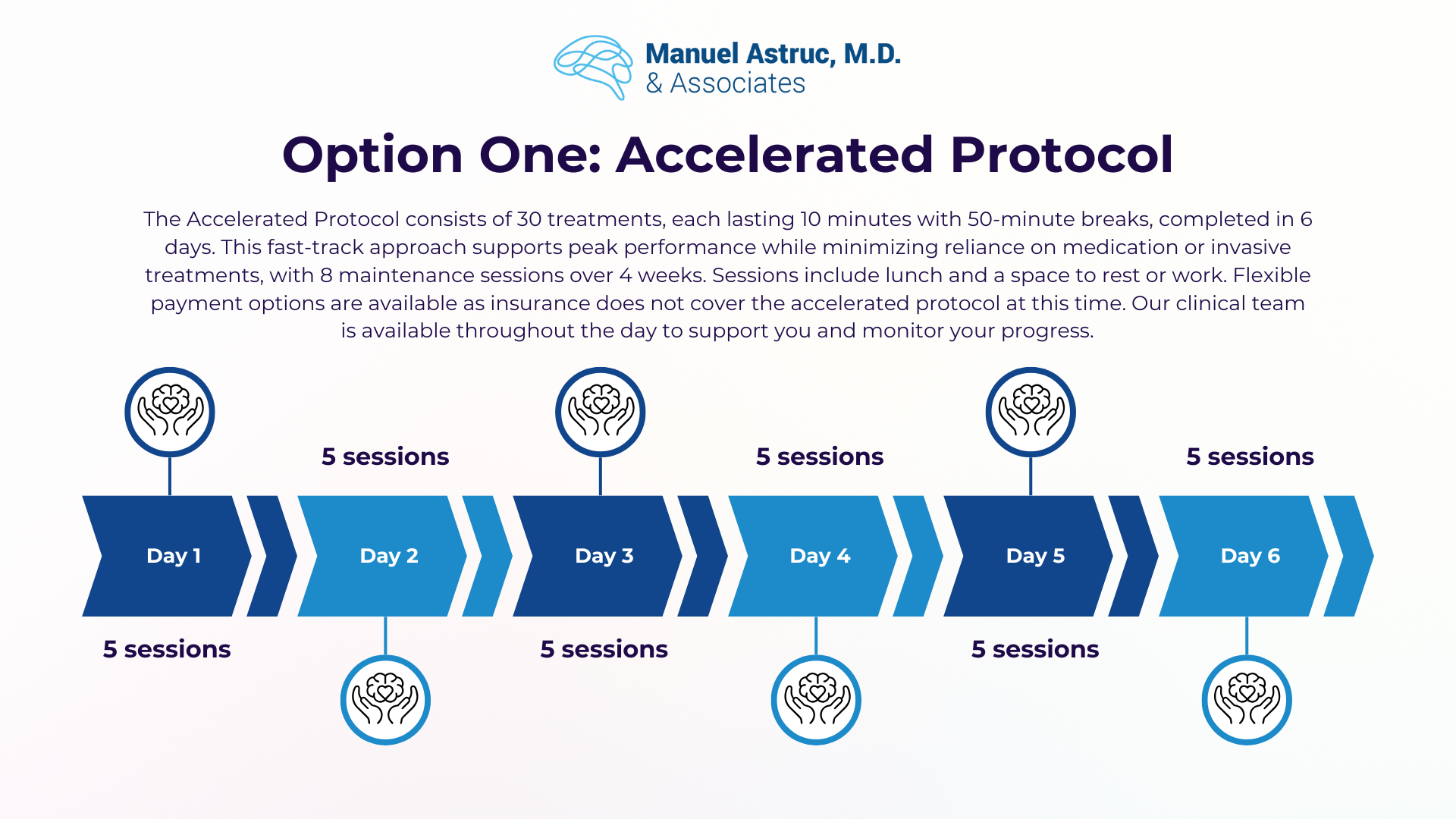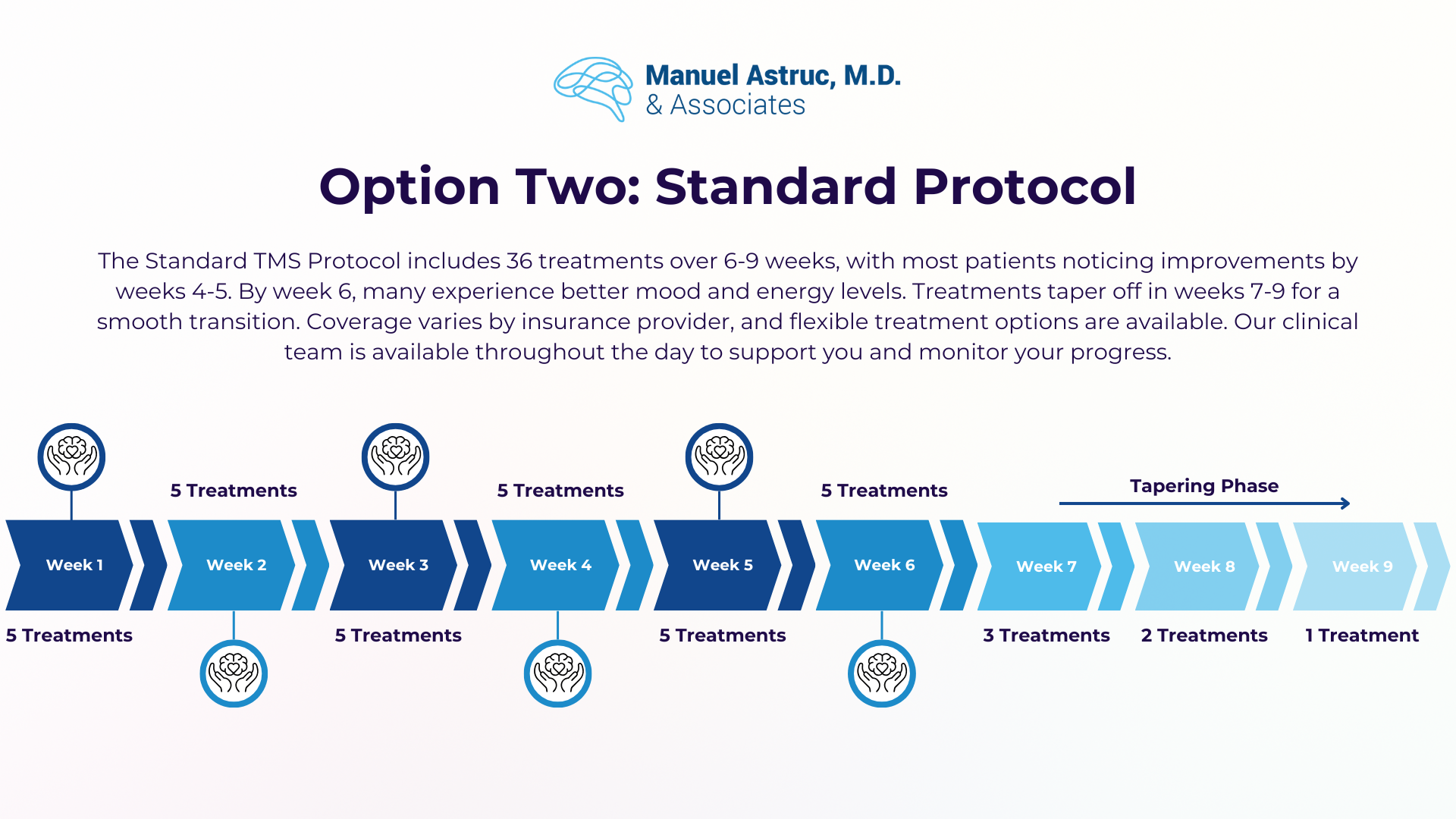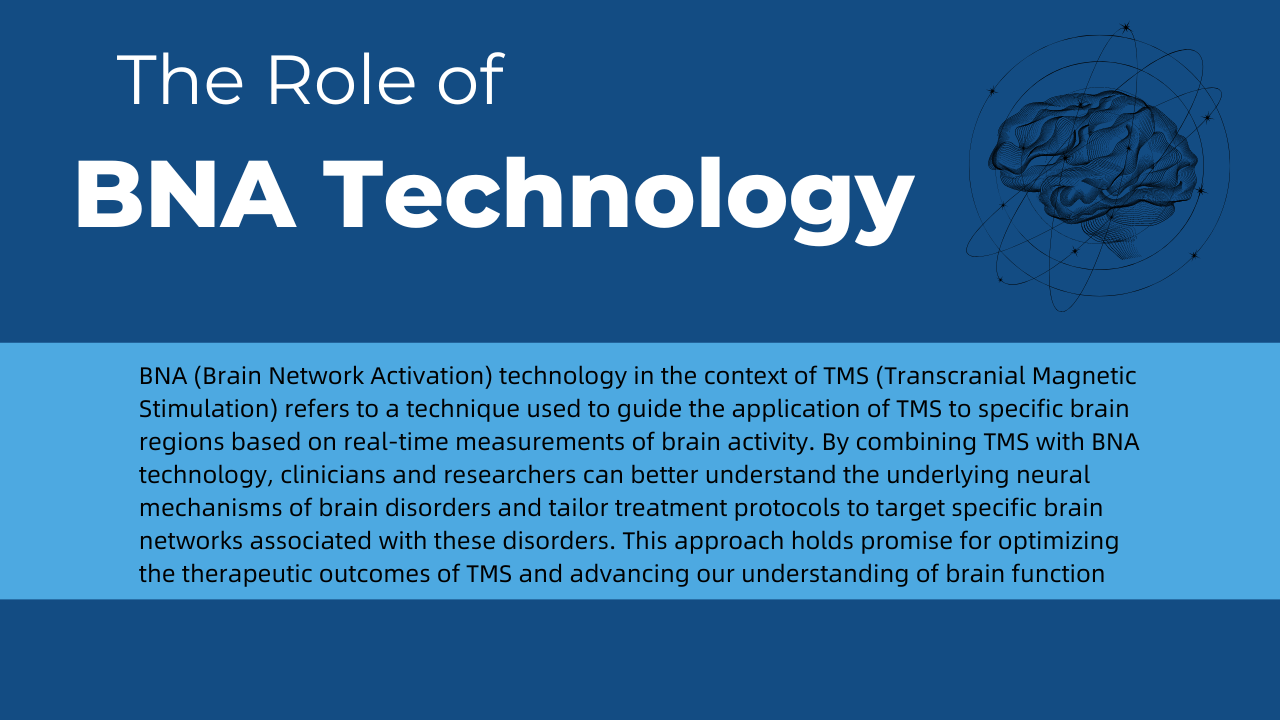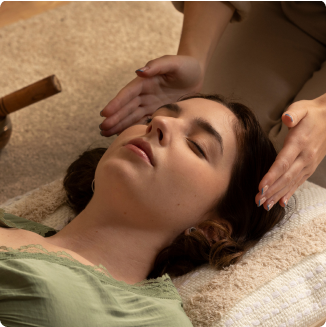Treat the root cause
of your depression
Experience the relief of TMS (transcranial magnetic stimulation), an FDA-approved and insurance-covered treatment that targets the root cause of depression. Reclaim your well-being with this safe and highly effective therapy.
Now offering Accelerated TMS! Feel better, faster, with upstate New York's only five-day TMS program offering a drug-free, non-invasive path to depression relief.
Treat the root cause of your depression
As a leading provider of TMS (transcranial magnetic stimulation) therapy in New York, Manuel Astruc, M.D. & Associates offers a safe and FDA-approved treatment that utilizes magnetic pulses to target the root cause of depression. This potent therapy is both highly effective and eligible for insurance coverage, and may be of great benefit to you. To learn more and schedule a consultation with our psychiatrists, click the link below.
Now offering Accelerated TMS! Feel better, faster, with upstate New York's only five-day TMS program offering a drug-free, non-invasive path to depression relief.
Why Choose TMS?
TMS therapy is effective, insured, and convenient.

Effective
About 75% of patients who complete a full course of TMS show a clinically meaningful response and about 50% experience a full remission, meaning their symptoms go away completely.

Insured
All major payers cover TMS treatment for Depression. If you've tried multiple antidepressants and therapy, there's a good chance your insurance covers it.

Convenient
Sessions are about 20 minutes and you can drive to and from your appointments. The full course covered by insurance usually takes about 6-8 weeks to complete.
Why Choose TMS?
TMS therapy is effective, insured, and convenient.



Effective
About 75% of patients who complete a full course of TMS show a clinically meaningful response and about 50% experience a full remission, meaning their symptoms go away completely.
Insured
All major payers cover TMS treatment for Depression. If you've tried multiple antidepressants and therapy, there's a good chance your insurance covers it.
Convenient
Sessions are about 20 minutes and you can drive to and from your appointments. The full course covered by insurance usually takes about 6-8 weeks to complete.
Feel Better, Faster - with Accelerated TMS
Saratoga County’s only six-day TMS program offers a drug-free, non-invasive path to relief.
This treatment is designed to help you reclaim your energy, improve your mood, and begin feeling like yourself again without long-term medication.
Accelerated TMS - What to Expect
Patients typically spend five hours per day at our office during the six-day protocol. The structure includes:
Five sessions per day
Each session lasts approximately 10 minutes
50-minute rest periods between each session
On-site space to rest, read, or work
Meal provided daily
Our clinical team is available throughout the day to support you and monitor your progress.


Your TMS Journey Begins Here!
Learn what happens next so that you can start your treatment with confidence
Feel Better, Faster - with Accelerated TMS
Saratoga County’s only six-day TMS program offers a drug-free, non-invasive path to relief.
This treatment is designed to help you reclaim your energy, improve your mood, and begin feeling like yourself again without long-term medication.
Accelerated TMS - What to Expect
Patients typically spend five hours per day at our office during the six-day protocol. The structure includes:
Five sessions per day
Each session lasts approximately 10 minutes
50-minute rest periods between each session
On-site space to rest, read, or work
Meal provided daily
Our clinical team is available throughout the day to support you and monitor your progress.


We Accept Insurance

We are not in network with Fidelis, Medicare, or Humana at this time.
Contact your insurance provider to find how TMS is covered for you, as well as what fees you might be responsible for.
It's not you, it's the brain

Depression is caused by a lack of sufficient activity in the left dorsolateral prefrontal cortex, essentially the front left part of your brain.
When this area is working properly, the entire brain lights up, creating an improved mood, working memory, and selective attention.

It's not you, it's the brain
Depression is caused by a lack of sufficient activity in the left dorsolateral prefrontal cortex, essentially the front left part of your brain.
When this area is working properly, the entire brain lights up, creating an improved mood, working memory, and selective attention.
Take Care Of
Your Mental Health
We care about your mental health, and want to help you get better!
Meet the Doctor

Dr. Astruc graduated from the Virginia Commonwealth School of Medicine in Psychiatry and has spent the last 15+ years in private practice in general psychiatry.
With over 50,000 hours of experience helping people find their way out of mental illness, Dr. Astruc loves getting to know his patients and helping them on their journey from despair to hope.
Find Us Here!
Meet the Doctor

Dr. Astruc graduated from the Virginia Commonwealth School of Medicine in Psychiatry and has spent the last 15+ years in private practice in general psychiatry. With over 50,000 hours of experience helping people find their way out of mental illness, Dr. Astruc loves getting to know his patients and helping them on their journey from despair to hope.
FAQ
What is TMS?
TMS (Transcranial Magnetic Stimulation) therapy is a non-invasive and FDA-approved treatment for various mental health conditions, including depression, anxiety, and obsessive-compulsive disorder (OCD). This therapy uses magnetic fields to stimulate nerve cells in the brain, which can alleviate symptoms and improve overall well-being.
How does TMS work?
TMS therapy works by using magnetic fields to stimulate specific areas of the brain that are associated with mood regulation and emotional processing. During a TMS session, a magnetic coil is placed against the scalp, and a rapidly changing magnetic field is generated, which induces an electrical current in the brain. This current can activate nerve cells that may not be functioning correctly, leading to improvements in symptoms related to depression, anxiety, and other mental health conditions. The exact mechanism by which TMS therapy produces its beneficial effects is still being studied, but it is believed to involve changes in neural plasticity and the release of neurotransmitters in the brain.
Is TMS for me?
Whether TMS therapy is right for you depends on various factors, including your specific symptoms, medical history, and treatment goals. TMS therapy has been shown to be effective for many individuals with depression, anxiety, and other mental health conditions, particularly those who have not responded well to traditional treatments such as medications or psychotherapy. However, it is important to consult with a healthcare professional to determine whether TMS therapy is a suitable option for you. A consultation with a TMS specialist can help you learn more about the treatment, its potential benefits, and whether it may be a good fit for your individual needs.
What does TMS feel like?
During a TMS (Transcranial Magnetic Stimulation) therapy session, you may feel a tapping or clicking sensation on your scalp where the magnetic coil is placed. This tapping sensation is typically painless and generally well-tolerated by most individuals. Some people also report feeling a mild headache or scalp discomfort during or after the treatment, but these side effects are usually temporary and go away shortly after the session is completed.
It's important to note that everyone's experience with TMS therapy is different, and some people may not experience any discomfort at all. If you have concerns about potential side effects or discomfort during TMS therapy, it's best to speak with a TMS specialist who can provide more detailed information and address any questions you may have.
Are there any side effects?
TMS (Transcranial Magnetic Stimulation) therapy is generally considered to be a safe and well-tolerated treatment for mental health conditions such as depression, anxiety, and obsessive-compulsive disorder. However, like any medical procedure, TMS therapy may be associated with some potential side effects.
Common side effects of TMS therapy include mild headache, scalp discomfort, and muscle twitching or spasms in the face or jaw during the session. These side effects are typically mild and short-lived, and can be managed with over-the-counter pain medication if needed.
Rarely, more serious side effects such as seizures or mania may occur, but these are extremely rare and typically only occur in individuals with certain pre-existing medical conditions. It's important to discuss any potential risks or concerns with a healthcare professional before starting TMS therapy.
Overall, TMS therapy is a safe and well-tolerated treatment option for many people with mental health conditions, and the benefits of the treatment generally outweigh the potential risks or side effects.
Is TMS covered by insurance?
Many insurance plans do cover TMS (Transcranial Magnetic Stimulation) therapy, but coverage varies depending on the specific plan and insurance provider. Some insurance plans may cover the full cost of TMS therapy, while others may cover only a portion of the cost or require a copayment or deductible.
It's always a good idea to check with your insurance provider to see if TMS therapy is covered under your plan and what your out-of-pocket costs may be. Some TMS clinics also offer assistance with insurance coverage and can help you navigate the insurance process.


Come Join Us And Take Care Of
Your Mental Health
We care about your mental health, and want to help you get better.
Our Services
Explore and book live and on-demand Yoga, Meditation and Art Therapy classes across the globe

Therapy

(234)

Yoga

(234)

Meditation

(234)
Success Stories
Discover the experiences of our patients who have undergone TMS therapy.

Sabrina
"I not only feel much better, I was able to get to know the amazing staff at the office! I feel alive again. I am so glad I decided to give it a try. I am so glad finished all the sessions. It works!"

Brycen
Your Paragraph text goes Lorem ipsum dolor sit amet, consectetur adipisicing elit. Autem dolore, alias, numquam enim ab voluptate id quam harum ducimus cupiditate similique quisquam et deserunt, recusandae. here

Meditation
Your Paragraph text goes Lorem ipsum dolor sit amet, consectetur adipisicing elit. Autem dolore, alias, numquam enim ab voluptate id quam harum ducimus cupiditate similique quisquam et deserunt, recusandae. here
Feel the relaxing Sensation

Private group
Join us as a member of a private group that will practice every
week and feel the benefits.

Pleasant situation
A pleasant atmosphere makes you enjoy doing yoga and focus on doing it.

Adequate tools
A pleasant atmosphere makes you enjoy doing yoga and focus on doing it.

What Patients Say

"Absolutely best Doctor that I have ever had. Very knowledgeable, innovative, and most importantly, very caring and concerned for his patients best interest!! He actually listens and doesn’t attempt to use a one size fits all attitude. Definitely an out of the box thinker. So very sincerely grateful for him. ❤️ A life saver on a multitude of levels!! Thank you Doc!"

Sharon B.
Saratoga Springs

"I highly recommend Dr. Manuel Astruc for his exceptional work in providing Transcranial Magnetic Stimulation (TMS) treatments. I have been a patient of
Dr. Astruc for almost a year, receiving TMS treatments, and have experienced significant improvements in my mental health and overall well-being."

Chelsea F.
Saratoga Springs
What Patients Say
"Absolutely best Doctor that I have ever had. Very knowledgeable, innovative, and most importantly, very caring and concerned for his patients best interest!! He actually listens and doesn’t attempt to use a one size fits all attitude. Definitely an out of the box thinker. So very sincerely grateful for him. ❤️ A life saver on a multitude of levels!! Thank you Doc!"

Sharon B.
Saratoga Springs
"I highly recommend Dr. Manuel Astruc for his exceptional work in providing Transcranial Magnetic Stimulation (TMS) treatments. I have been a patient of
Dr. Astruc for almost a year, receiving TMS treatments, and have experienced significant improvements in my mental health and overall well-being."

Chelsea F.
Saratoga Springs

Come Join Us And Take Care Of Your Mental Health
Join us now and begin the positive change you deserve.

Come Join Us And Take Care Of Your
Mental Health
Ready to take charge of your mental health journey?
Join us now and begin the positive change you deserve.



